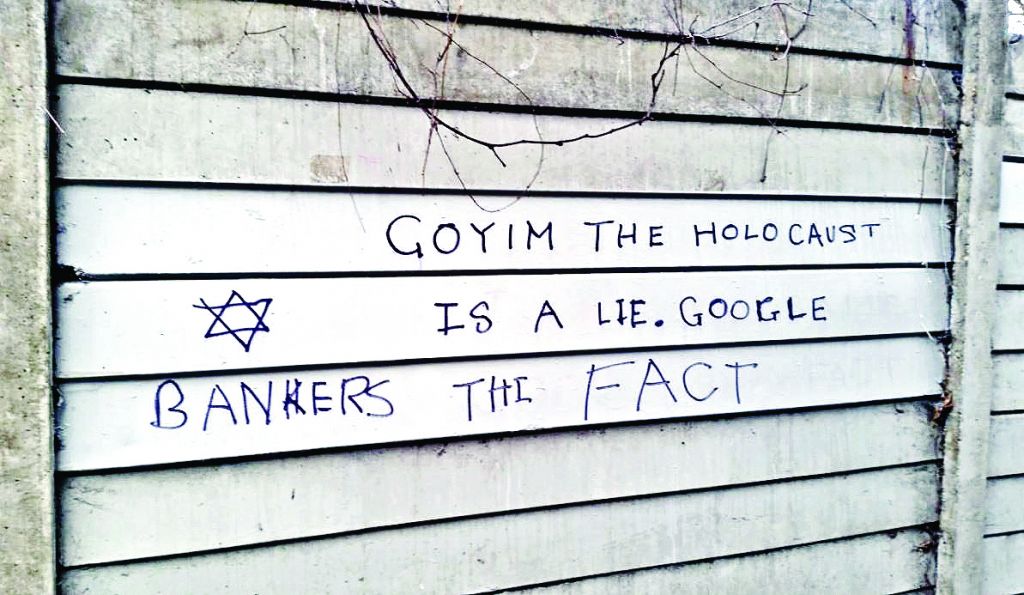Revealed: Five percent of Brits are anti-Semites, 30 percent hold one hateful view
Anti-Semitism in UK 'among the lowest in the world' according to a new wide-ranging report by the Institute for Jewish Policy Research with the CST
Jenni Frazer is a freelance journalist
A new report said to be the biggest and most comprehensive survey of its kind has concluded that levels of anti-Semitism in contemporary Great Britain are “among the lowest in the world” — but notes that “30 percent of British society hold at least one anti-Semitic attitude”.
However, as Jonathan Boyd, the director of the Institute for Jewish Policy Research, which has produced the report in conjunction with the Community Security Trust, made clear, “this emphatically does not mean that 30 percent of Great Britain is anti-Semitic”.
And, after the launch of the report at the JPR headquarters on Tuesday, Dr Boyd told the JN that as yet unanalysed data from the survey showed that “people who know Jews are less likely to be anti-Semitic”.
The survey, written by Dr Daniel Staetsky, the JPR’s senior research fellow, is thought to be the most widespread ever undertaken in Britain. The process, with the support of the Pears Foundation, has been three years in the making and looks at attitudes to Jews and Israel, with a breakdown of the correlation between anti-Semitism and anti-Israel-ism. It very specifically does not look at levels of anti-Semitic hate crime.
Speaking at the launch, Lord Bourne of Aberystwyth, who is the government’s Minister of Faith, welcomed the report and said it would help to shape policy for combating anti-Semitism and other kinds of racial hatred.
The survey, which gathered, via the Ipsos Mori polling company, national feedback from an initial 4.005 respondents in 2016, includes a second tier taken early this year, from sub-groups of the far Left, the far Right, and Muslims, giving a total of 5,466 responses. The responses were gathered both face-to-face and online.
There are three central questions: how common are anti-Semitic and anti-Israel attitudes, are they linked, and are any specific groups anti-Semitic, and if so, which.
But the report goes further because it makes a distinction between “anti-Semites” and “anti-Semitism”, and in what it calls “the elastic view” introduces a different way to measure anti-Semitism. The report says: “Determining what is, and what is not, an anti-Semitic attitude is not always clear. In keeping with the elastic view, we draw a critical distinction between counting anti-Semites and measuring anti-Semitism”.
As Dr Staetsky acknowledged, it is not always possible to get a truthful answer from respondents when they are being asked if they hold attitudes which are perceived to be politically incorrect. However, the survey shows that “the existence of strong, sophisticated, perhaps internally coherent and at times even ‘learned’ anti-Semitism, where open dislike of Jews is combined with developed negative ideas about Jews, does not exceed 2.4 percent of British adults… these are people who express multiple anti-Semitic attitudes readily and confidently”.
The report shows that while only five percent of British adults can reasonably be called anti-Semites, 30 percent of people hold at least one anti-Semitic attitude, often unwittingly. “This means that while Jewish people are unlikely to meet genuine anti-Semites, they are much more likely to encounter views that they may consider offensive or threatening”.

People were asked eight different “anti-Semitic” questions and asked to say with how many they agreed. Hard-core anti-Semites — of whom there were relatively few, but far more on the far Right than on the far Left — agreed with more of these ideas. “The most offensive and extreme forms of Holocaust denial are especially rare: about two percent maintain that the Holocaust is a myth, and four percent either strongly believe or tend to believe that the Holocaust has been exaggerated.”
But the report also shows that “other ideas are not as marginal. About 10 percent to 13 percent of the population agree to some extent with the assertions that Jews think that they are better than other people, that the interests of Jews in Britain are different from the interests of the rest of the population, that Jews get rich at the expense of others, and that Jews exploit Holocaust victimhood for their own purposes”.
The survey uses the same approach to gauge anti-Israel attitudes, again asking a core number of questions and measuring how many of those tick the boxes. The data shows that 12 percent of people in Britain can be described as having hard-core anti-Israel views; a further 21 percent have “softer’” negativity towards Israel; and a total of 56 percent of the population hold at least one anti-Israel attitude”.

Collating the two sets of responses, the survey shows that, although anti-Israel attitudes do not always come together with anti-Semitism, “the stronger a person’s anti-Israel views, the more likely they are to hold anti-Semitic attitudes as well. This is the first time that this kind of statistical analysis has been used to demonstrate that a person who is strongly anti-Israel is considerably more likely to be anti-Semitic than a person who does not hold any anti-Israel views”.
Speaking at the launch, the CST’s Dr Dave Rich, author of “The Left’s Jewish Problem”, Professor Rusi Jaspal of De Montfort University, and author of Anti-Semitism and Anti-Zionism, and Sally Sealey, OBE, the leading civil servant on tackling hate crime at the Department of Communities and Local Government, all agreed that the research had important pointers for future policy-making. Dr Rich said the work resonated with material produced by the CST last year.
Gideon Falter, of the Campaign Against Antisemitism, whose own report about anti-Jewish attitudes in Britain came out several weeks ago and led to sensational headlines in the national press, was present at the launch event. But he indicated later that he felt that his report dovetailed with the findings in the JPR/CST survey.
Stephen Moss, chairman of the JPR, said that there was considerable data yet to be analysed and suggested that a second report based on these findings could be published next year.

Thank you for helping to make Jewish News the leading source of news and opinion for the UK Jewish community. Today we're asking for your invaluable help to continue putting our community first in everything we do.
For as little as £5 a month you can help sustain the vital work we do in celebrating and standing up for Jewish life in Britain.
Jewish News holds our community together and keeps us connected. Like a synagogue, it’s where people turn to feel part of something bigger. It also proudly shows the rest of Britain the vibrancy and rich culture of modern Jewish life.
You can make a quick and easy one-off or monthly contribution of £5, £10, £20 or any other sum you’re comfortable with.
100% of your donation will help us continue celebrating our community, in all its dynamic diversity...
Engaging
Being a community platform means so much more than producing a newspaper and website. One of our proudest roles is media partnering with our invaluable charities to amplify the outstanding work they do to help us all.
Celebrating
There’s no shortage of oys in the world but Jewish News takes every opportunity to celebrate the joys too, through projects like Night of Heroes, 40 Under 40 and other compelling countdowns that make the community kvell with pride.
Pioneering
In the first collaboration between media outlets from different faiths, Jewish News worked with British Muslim TV and Church Times to produce a list of young activists leading the way on interfaith understanding.
Campaigning
Royal Mail issued a stamp honouring Holocaust hero Sir Nicholas Winton after a Jewish News campaign attracted more than 100,000 backers. Jewish Newsalso produces special editions of the paper highlighting pressing issues including mental health and Holocaust remembrance.
Easy access
In an age when news is readily accessible, Jewish News provides high-quality content free online and offline, removing any financial barriers to connecting people.
Voice of our community to wider society
The Jewish News team regularly appears on TV, radio and on the pages of the national press to comment on stories about the Jewish community. Easy access to the paper on the streets of London also means Jewish News provides an invaluable window into the community for the country at large.
We hope you agree all this is worth preserving.






















